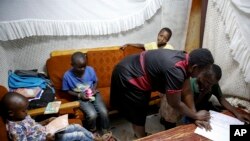Online learning during the coronavirus pandemic is providing opportunities to hundreds of students in northeast Kenya, where school was cancelled even before COVID-19, as teachers fled terrorist attacks. The al-Shabab militant group killed six teachers and four students in Garissa county in January and March. But distance learning is allowing teachers and students to safely complete the school year, a practice that many in the area hope to continue after the pandemic.
Eighteen-year-old Halima Abdinoor, a high school student in Garissa, northeastern Kenya, says all she needed was online learning to finish her education.
“We only covered three chapters and in physics its always ten subjects," said Abdinoor. "So were really behind in that subject, and in these online classes in just two months, we have finished, and we did the revision.”
Abdinoor’s school closed in January when instructors backed by the Teachers Service Commission, or TSC, withdrew from the area due to insecurity. All schools in Kenya closed in mid-March due to the COVID-19 pandemic.
The shutdown left Abdinoor feeling helpless.
“It was really very hard for us, we were so worried, and we have been waiting for it, it is our final year," said Abdinoor. "We have been struggling since primary then secondary, it is our final year, and we had no teachers. We have been very worried. So this lockdown came and became another problem for us.”
But with a smartphone and internet, students can learn and finish their course work.
Moustapha Kassim is one of the teachers helping students like Abdinoor with their online studies. He says in just two months, the students mood changed from hopelessness to joy.
“In the last two months we have been able to run through because we were having about five days a week two hours, we were able to run through all the topics that they were supposed to have done," said Kassim. "They were in despair. They didn’t know if this would work, and by the end of the day after two months, they were happy. They joined the group.”
Fatuma Dubow of the “Northern Innovation and Empowerment Hub,” an organization that helps women and youth in the region, says online learning can save students in the area now and in the future.
“Northeastern is still insecure, and the teachers from TSC will not be posted again, there will be issues, so this is something that will continue post-COVID, and our plan is to work now directly with the schools and to have proper tech set up and to have teachers in other areas of Kenya still support these kids," said Dubow.
The women’s organization, which consists of professionals from the region, has hired three science teachers to help high school candidates to prepare for their exams.
John Kemuru teaches chemistry. He says the students can benefit from the current program even when schools reopen.
“This is something you can teach even if you are far from each other. Therefore you can be able to reach them as long as there is that online platform that’s continuing," said Kemuru. "The students will be very much catered for so I think is going to help them much even after we resume schools.”
Garissa, Mandera, and Wajir counties, have experienced numerous terror attacks targeting schools, government facilities and security forces.
In the worst incident, al-Shabab attacked Garissa University College in 2014, killing 150 people, most of them students.
